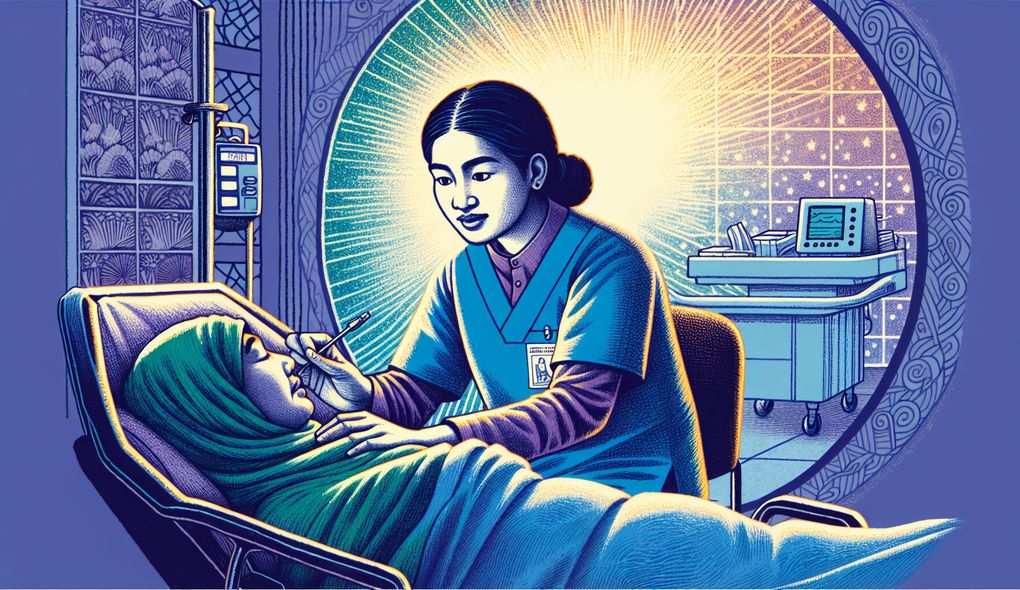Can you describe a complex clinical situation you have encountered and how you handled it?
INTERMEDIATE LEVEL

Sample answer to the question:
Yes, I can describe a complex clinical situation I encountered. One time, I had a patient who was experiencing a high-risk pregnancy due to gestational diabetes and pre-eclampsia. During labor, the patient's blood pressure suddenly spiked, and she started showing signs of eclampsia. I immediately notified the obstetrician and gathered the necessary emergency equipment. I assisted in stabilizing the patient by administering magnesium sulfate to prevent seizures and monitoring her vital signs closely. I communicated with the patient and her family to provide emotional support and reassurance. After a few hours, the patient's condition improved, and she gave birth to a healthy baby. I continued to monitor her closely postpartum, ensuring her blood pressure remained stable. Overall, I handled this complex clinical situation by relying on my critical thinking skills, effective communication, and ability to remain calm under pressure.
Here is a more solid answer:
Absolutely! Let me describe a complex clinical situation I encountered in detail. I was taking care of a pregnant patient who had a history of multiple miscarriages and was diagnosed with antiphospholipid syndrome. During labor, the patient suddenly developed severe bleeding and signs of disseminated intravascular coagulation (DIC) due to placental abruption. I quickly initiated the hospital's massive transfusion protocol and coordinated with the blood bank to ensure a steady supply of blood products. With excellent communication, I informed the obstetrician, anesthesiologist, and neonatal team to prepare for an emergency cesarean section. Throughout the procedure, I closely monitored the patient's vital signs, administered blood products, and coordinated with other healthcare professionals involved in caring for the mother and baby. Thanks to our collaborative efforts, we successfully delivered the baby and stabilized the patient's condition. I continued to provide postpartum care, closely monitoring the patient's recovery and facilitating emotional support for both the patient and her family.
Why is this a more solid answer?
The solid answer provides a more detailed description of a complex clinical situation, including specific details such as antiphospholipid syndrome, placental abruption, and disseminated intravascular coagulation (DIC). The candidate demonstrates their critical thinking and problem-solving skills by initiating the hospital's protocols, coordinating with the blood bank, and communicating with other healthcare professionals. The answer also addresses the evaluation areas mentioned in the job description, such as collaboration with healthcare professionals and clinical knowledge and skills. However, the candidate could further enhance the answer by mentioning their experience with electronic health record (EHR) systems and their ability to multitask efficiently in a fast-paced environment.
An example of a exceptional answer:
Certainly! Let me share with you an exceptional complex clinical situation I handled. I had a patient who was admitted to the labor and delivery unit with a history of uterine rupture during a previous delivery. The patient presented with severe abdominal pain and signs of fetal distress. Upon assessing her, I immediately recognized the need for an emergency cesarean section due to impending uterine rupture. I promptly activated the hospital's obstetric emergency response team and coordinated with the operating room staff to ensure a swift and efficient transfer. While preparing the patient for surgery, I provided emotional support and reassurance to alleviate her anxiety. In the operating room, I assisted the obstetrician in performing the cesarean section while simultaneously managing the patient's hemodynamic stability and monitoring the fetal well-being. The procedure went smoothly, and we successfully delivered a healthy baby. I continued to closely monitor the patient's postoperative recovery, providing pain management and multidisciplinary support. Through effective communication and collaboration, we ensured the patient's physical and emotional well-being, highlighting the importance of teamwork in managing complex clinical situations.
Why is this an exceptional answer?
The exceptional answer provides a highly detailed account of a complex clinical situation, showcasing the candidate's expertise and ability to handle high-risk cases. The candidate demonstrates exceptional critical thinking skills by recognizing the need for an emergency cesarean section based on the patient's history and assessment findings. The answer also highlights the candidate's ability to provide emotional support to the patient and effectively coordinate with the obstetric emergency response team and operating room staff. The detailed description of the candidate's involvement during the cesarean section and postoperative care further reinforces their clinical knowledge and skills. This answer encompasses all the evaluation areas mentioned in the job description and goes above and beyond in demonstrating the candidate's qualifications.
How to prepare for this question:
- Review your previous clinical experiences and identify complex situations you have encountered. Make a list of the clinical situations you can discuss during the interview.
- Choose a clinical situation that best aligns with the job requirements. For a Labor and Delivery Nurse Practitioner role, prioritize situations related to prenatal care, delivery, and postpartum care.
- Prepare a structured response that includes specific details about the complex clinical situation, the steps you took to handle it, and the outcomes. Emphasize your critical thinking, problem-solving abilities, and collaboration with other healthcare professionals.
- Highlight your expertise in using electronic health record (EHR) systems and your ability to multitask in fast-paced environments. Mention any additional certifications or training you have in fetal monitoring or labor management techniques.
- Practice your response to ensure a clear and concise delivery. Use natural language and provide enough context to help the interviewer understand the complexity of the situation and your role in managing it.
What are interviewers evaluating with this question?
- Empathy and emotional support
- Critical thinking and problem-solving
- Collaboration with healthcare professionals
- Clinical knowledge and skills

